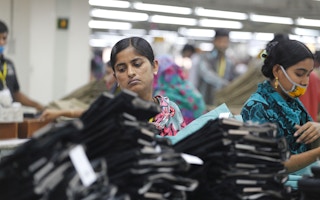Garment workers in south India are to receive counselling to help them cope with problems from work pressure to sexual harassment after a series of deaths in factories and hostels, a local official said on Wednesday.
Most of the those working in the $42 billion-a-year export industry are young women living in hostels far from home and forced to work long hours and endure sexual and verbal abuse.
“
The workers are treated as machines and not as young adults dealing with work pressure and emotional issues. There is no counselling to help them and no one is held accountable when they die.
Aloysius Arokiam, executive director, Social Awareness and Voluntary Education
Twenty have died in the last three months in the southern state of Tamil Nadu, a garment manufacturing hub, many in suspected suicides.
“There is a lot of stress and trauma inside factories,” said Aloysius Arokiam of Social Awareness and Voluntary Education, a civil society group.
“The workers are treated as machines and not as young adults dealing with work pressure and emotional issues. There is no counselling to help them and no one is held accountable when they die.”
Last month a 17-year-old spinning mill worker died in her hostel room, the tenth death recorded in Dindigul district in the last three months, according to the Tamilnadu Textile and Common Labour Union (TTCU).
“Her family suspects she was sexually harassed in the mill and driven to commit suicide,” the president of the TTCU Thivyarakhini Sesuraj told the Thomson Reuters Foundation.
“There is no thorough investigation into why these young people are dying. We are demanding a proper probe by senior officials.”
Campaigners have recorded 10 more deaths in the Tirupur and Erode districts that make up what is known as the “Textile Valley of India”, where much of the industry is located.
“The hostels where the girls stay are not registered properly and there is no accounting for the number of workers,” said Karrupu Samy, director of READ, a charity that works with garment workers in the Erode district.
“We have documented at least 55 deaths between 2015 and 2017, all suicides in mill hostels. These are not one off cases.”
The Dindigul administration will run sensitisation workshops in a first-of-its kind effort to improve working conditions in up to 200 spinning mills.
“The idea is to empower girls to report harassment, help them to deal with the work pressure and give them opportunities to continue their education,” the head of the administration T.G. Vinay told the Thomson Reuters Foundation.
The Tamilnadu Spinning Mills Association, which represents more than 650 mills, has also initiated counselling sessions in the past few months.
“Not all these deaths are related to work and in many cases it is family problems that drive them to take this step,” said K. Venkatachalam of the association.
“We are not shrugging off our role as employees and have called senior doctors to come and talk to the girls recently.”
This story was published with permission from Thomson Reuters Foundation, the charitable arm of Thomson Reuters, that covers humanitarian news, women’s rights, trafficking, property rights, climate change and resilience. Visit http://news.trust.org.










